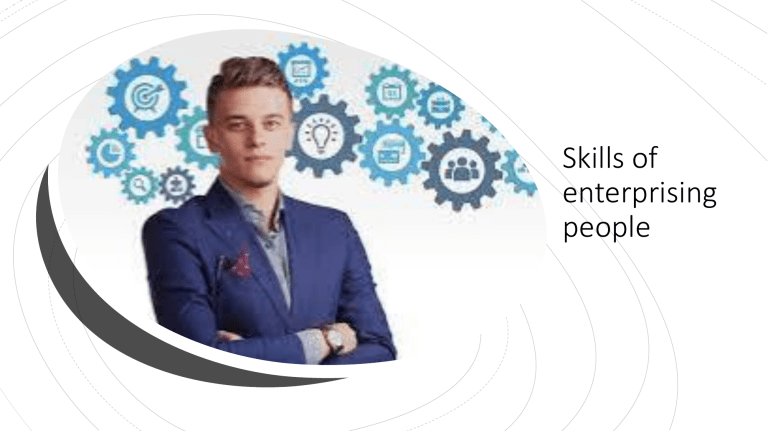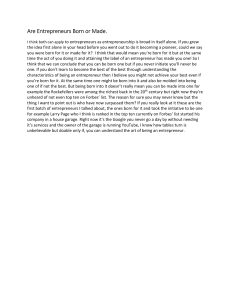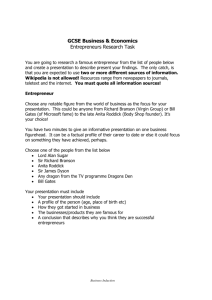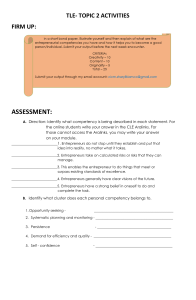
Skills of enterprising people Skills and attributes needed by entrepreneurs • Entrepreneurs will have to possess the necessary practical and technical skills to put their ideas into effect. A good example of such an entrepreneur is Sir James Dyson. Sir James Dyson • Sir James Dyson is a British inventor, industrial designer and founder of the Dyson company, established in 1993. • He is best known as the inventor of the dual cyclone bagless vacuum cleaner. • Dyson had the practical skills and knowledge to design and create a vacuum cleaner that was unique because it did not require a bag to collect the dirt. • Instead, he applied the idea of cyclonic separation, which avoided the weakness of traditional vacuum cleaners which lost suction power as the bag became full Extension question • Discuss the importance of Entrepreneurs having the practical skills and knowledge to create products. Leadership • The quality of leadership is crucial to the successful running of an enterprise. Effective leadership involves ; • decisiveness and the ability to think ahead come on especially in relation to seeing opportunities, anticipating problems, sensing change and responding to it. • Exercising good judgement and taking the correct decisions • The ability to make others believe in and want to share the leader’s vision. Leadership • The best leaders or inspirational and have the type of personality and character that people can believe in. • This encourages employees and other people to want to share the leaders vision admission. • Additional qualities that will help him to lead effectively are charisma, imaginativeness , energy , ambition and courage. Leadership • There are different types of leaders. Three distinctive types of leader are: • autocratic leaders, who assume a great deal of Power and responsibility in an enterprise, taking all the major decisions • democratic leaders, who encourage others in the enterprise to be involved in decision making as much as possible. • Laissez-faire leaders, who allow employees to carry out a range of activities with relatively few guidelines or directions. Influencing skills • It is vitally important that an entrepreneur has the ability to influence other people and the decisions that they make if the enterprise is going to succeed. This skill is vital in a number of different situations, such as negotiating, building a team and dealing with stakeholders. • The ability to influence others is dependent on having good interpersonal and communication skills. Interpersonal and communication skills include the tools that people use to interact and communicate with each other. They can include: • verbal communication, • nonverbal communication, • listening skills, • decision making and • assertiveness. Team work Extension question • Research two different entrepreneurs or enterprises. How important has team building been to their success? • Suggestion: Richard Branson and Ambareesh Murty Delegation • Although responsible for taking key decisions in the enterprise, entrepreneurs will not be able to take every decision. They will need to delegate, which means posing some responsibility or authority to others in the enterprise to carry out specific activities Extension question • Research two different entrepreneurs and analyse how important their ability to delegate effectively has been to their success. • Suggestion: Richard Branson and Sir John Dyson Problem solving • Entrepreneurs need to • recognise the core of the problem and • have the ability to look at it from different perspectives in order to find a solution. • Sometimes these solutions may be very radical or innovative, as entrepreneurs often have to, if they and their enterprises are to achieve success. Extension question • Research one of the most successful entrepreneurs of our time, Bill Gates, and the problems he had to overcome when he started his own company. • Read here Time management • Entrepreneurs need to be able to focus on the most important aspects of the work. • This means they need to distinguish between important and unimportant aspects. • If they allowed him selves to get distracted by less important tasks, it can be catastrophic for their enterprise. • That's why an entrepreneur needs to prioritise which tasks are more important than others. • A successful entrepreneur will organise his time as efficiently as possible . Self-confidence • Leader of an enterprise likely to have a lot of self-confidence . • Self-confidence can inspire confidence in the people around them. • Entrepreneurs needs to be selfconfident in their ability to succeed, and in their product and the enterprise. • if an entrepreneur is not naturally selfconfident, they have to develop this skill, just like any other skill, in order to succeed. Case study Richard Branson Sir Richard Branson is an English entrepreneur born in 1950. • He is the founder of the virgin group, which comprises a variety of different companies such as Virgin Atlantic Airways, Virgin Trains and Virgin Mobile. • His first enterprise, set up when he was 16, was a magazine called student. These other enterprises have included virgin records, Virgin Media and Virgin Galactic. • Branson has always had a great deal of self-confidence. • His interest in enterprise teams from a need to set himself massive challenges and to try as hard as possible to rise above them and achieve success. • He emphasizes is that he has never started an enterprise that he has not been passionate about. • He also stresses the importance of optimism and says that the problems he has faced intensified his determination to be successful. Resourcefulness • In order to achieve success, entrepreneurs need to have (or be able to gain) various resources that are necessary to the success of the enterprise. • Resource fullness includes the ability to use the available resources to meet new and different situations. Extension question • Research two different entrepreneurs. How successful has their resourcefulness been to their success. • Suggestion: Sam Walton and Richard Branson • Why is resourcefulness important to the success of an entrepreneur Innovation • Innovation is the process of putting the new idea into practice. There are actually two types of innovation • product innovation come out with a new product is brought into the marketplace • Process innovation, where new ways of doing something are introduced • Entrepreneurs are often innovative. they are continue trying to come up with new ideas and develop new products. • Many challenge traditional or orthodox approaches to problems and create new solutions. • Steve Jobs, the founder of the technology business apple, stated that innovation was the most important attribute that distinguished a leader from a follower. Case study Steve Jobs • Steve Jobs was an American entrepreneur. Next time he was born in 1955 and died in 2011. • He was the Co-founder, chairman and chief executive officer (CEO) of Apple. • Jobs is regarded as having been an important pioneer of the personal computer revolution. • He oversaw the development of the iMac, iTunes, the iPod, the iPhone and the iPad. • Among other things, jobs has been described as a visionary, the father of the digital revolution and a master of innovation Extension question Research Steve Jobs and explain why he has been described as a master of innovation. Case study • Nkemdilim Begho • Nkemdilim Begho Is the managing director of the Nigeria IT business Future Software Resources and the winner of the 2012 Etisalat Nigeria Prize for innovation. • She believes that innovation in Africa can be improved by supporting anyone who has an innovative idea, and that prizes for innovation helped to provide this support. Extension question Discuss how prizes and competitions can support innovation. Taking initiative • Willingness to take the initiative is crucial to entrepreneurs' success. • Entrepreneurs should not wait to see what happens but should be bold and decisive. • They need to be proactive rather than reactive, which means that the judgement is vitally important to their success. Case study • Anya Cherneff • Anya Cherneff is a cofounder of empower generation in Nepal. • This enterprise aims to encourage widespread adoption of clean energy in developing countries by connecting female entrepreneurs and technology providers . • She took the initiative to widen these opportunities by enabling female entrepreneurs in developing countries to develop their own clean energy enterprises. Extension question Consider why it is important for entrepreneurs like Cherneff to take the initiative. Taking calculated risks • • • • Risk is at the heart of enterprise. There are no guarantees of success. No matter how strongly an entrepreneur believes in the likelihood of a product succeeding, the customers will ultimately decide whether an enterprise is a success or not. It has been estimated that approximately one in five of new products introduced into the marketplace is likely to be successful, which means that there is an 80% risk of a new product failing. Taking calculated risks • Despite this, entrepreneurs take the risk of launching new products and enterprises in the knowledge that the product or enterprise may fail. • This is known as a calculated risk. • At the heart of the calculation is the relationship between the risk and the reward. • One important aspect of taking a calculated risk is that, if the enterprise or product fails, the entrepreneur must learn from this experience . Case study • Jennifer Liu • Jennifer Liu Is an entrepreneur in Hong Kong . • In 2003, Hong Kong economy was badly affected by the outbreak of severe acute respiratory syndrome (SARS) , which killed almost 300 people in Hong Kong . • While many businesses in the city closed, Lou started a coffee chain, Habitu. • This was a calculated risk, SARS had a huge effect on business confidence in Hong Kong , but Leo was determined to make the enterprises success. Habitu • now has 20 shops and plans to open more. Read more here Extension question Discuss why it is often important for an entrepreneur to be willing to take a calculated risk. Taking responsibility • To succeed, entrepreneurs must be able and willing to take responsibility. • Especially when their enterprise experiences difficulties. • This means that they must be accountable for what is going on in an enterprise. Motivation and determination to succeed Never consider the possibility of failure; as long as you persist, you will be successful. ~Brian Tracy Case study • Frans Aupa Indongo • Frans Aupa Indongo was an entrepreneur before Namibia gained independence. • He was determined to be successful, although the apartheid regime at the time made this very difficult for black entrepreneurs. • He started the brickmaking enterprise in the 1950s then diversified into other enterprises , including clothing and sugar. • His enterprises now employ over 1000 people in Namibia. Read more here Extension question • Discuss why Idongo is a good example of the importance of determination to succeed to a successful entrepreneur Creativity Perseverance • Entrepreneurs need to persevere, especially when the enterprise is experiencing difficulties. • Perseverance is the refusal to give up , which means that an entrepreneur will continue to aim to achieve success even if they experience obstacles. • Having a vision Is important because it gives an entrepreneur goals to work towards. Case study • Arjun travels to and from school on the school bus. • One day a cyclone hit the city where Arjun lives causing disruption that meant his journey back home took a very long time. • By the time he got home his parents were very worried. • Arjun use his resourcefulness to innovate the simple product that would let his parents track the travel progress of the school bus and receive alerts if the bus ran late. • He created Ez School Bus Locator for which he won the Massachusetts Institute of technology app inventor contest in December 2013 . • Since then, he has taken a calculated risk to set up his own company and, at 15 years of age, Arjun Santoth Kumar became CEO of his company, Latera Logics. • the company makes custom apps for mobile phones and websites. • Read more here Extension questions • Identify the three enterprise skills that Arjun used to make his enterprise a success. • Explain how you used one enterprise skill in your enterprise project. Do Activity 2.2 on page 28 of your textbook. Activity 2.2 • In this activity you explore the skills you think are most important in an enterprising person . Draw body outline like the one shown on his sheet of paper and label all the enterprise skills you think the successful enterprising person should have. • Decide on the top ten skills and then rank them in order of importance, One being the most important and 10 being the least important. • When you have done this, have a discussion with your club class to see if others had the same top ten as you.



